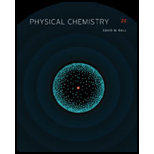
Physical Chemistry
2nd Edition
ISBN: 9781133958437
Author: Ball, David W. (david Warren), BAER, Tomas
Publisher: Wadsworth Cengage Learning,
expand_more
expand_more
format_list_bulleted
Question
Chapter 18, Problem 18.20E
Interpretation Introduction
Interpretation:
The values of
Concept introduction:
A molecule is made up of atoms that are bonded together by covalent bonds. These bonds undergo a to and fro movement to vibrate. This vibration of the molecule contributes to the overall partition function of the system. The vibrational partition function of the diatomic atom at is represented as,
Where,
•
•
•
•
Expert Solution & Answer
Want to see the full answer?
Check out a sample textbook solution
Students have asked these similar questions
Calculate the rotational constant (B) for the molecule H12C14N, given that the H-C and C-N bond distances are 106.6 pm and 115.3 pm respectively.
The vibrational wavenumber of the oxygen molecule in its electronic ground state is 1580 cm−1, whereas that in the excited state (B 3Σu−), to which there is an allowed electronic transition, is 700 cm−1. Given that the separation in energy between the minima in their respective potential energy curves of these two electronic states is 6.175 eV, what is the wavenumber of the lowest energy transition in the band of transitions originating from the v = 0 vibrational state of the electronic ground state to this excited state? Ignore any rotational structure or anharmonicity.
The rotational constant of 1H35CI is 317.8 GHz. What is the separation of the lines in its pure rotational spectrum (a) in gigahertz. (b) in reciprocal centimetres?
Chapter 18 Solutions
Physical Chemistry
Ch. 18 - Prob. 18.1ECh. 18 - Prob. 18.2ECh. 18 - Prob. 18.3ECh. 18 - Prob. 18.4ECh. 18 - The following are the first four electronic energy...Ch. 18 - Prob. 18.6ECh. 18 - Prob. 18.7ECh. 18 - Prob. 18.8ECh. 18 - Prob. 18.9ECh. 18 - Prob. 18.10E
Ch. 18 - Prob. 18.11ECh. 18 - Prob. 18.12ECh. 18 - Prob. 18.13ECh. 18 - Prob. 18.14ECh. 18 - Prob. 18.15ECh. 18 - Prob. 18.16ECh. 18 - Prob. 18.17ECh. 18 - Prob. 18.18ECh. 18 - Prob. 18.19ECh. 18 - Prob. 18.20ECh. 18 - Prob. 18.21ECh. 18 - Prob. 18.22ECh. 18 - Prob. 18.23ECh. 18 - Prob. 18.24ECh. 18 - Prob. 18.25ECh. 18 - Prob. 18.26ECh. 18 - Prob. 18.27ECh. 18 - Prob. 18.28ECh. 18 - Prob. 18.29ECh. 18 - Prob. 18.30ECh. 18 - Prob. 18.31ECh. 18 - Prob. 18.32ECh. 18 - Prob. 18.33ECh. 18 - What are qnuc and qrot for N2(I=1)? See Table 18.3...Ch. 18 - The rovibrational spectrum of acetylene, HCCH,...Ch. 18 - Prob. 18.36ECh. 18 - Prob. 18.37ECh. 18 - Prob. 18.38ECh. 18 - Prob. 18.39ECh. 18 - Prob. 18.40ECh. 18 - Prob. 18.41ECh. 18 - Prob. 18.42ECh. 18 - Use equation 18.44 to show that pV=NkT.Ch. 18 - Prob. 18.44ECh. 18 - Determine E,H,G, and S for CH4 at standard...Ch. 18 - Prob. 18.48ECh. 18 - Prob. 18.49ECh. 18 - Calculate the heat capacity of NO2 at 298K and...Ch. 18 - Prob. 18.51ECh. 18 - In Chapters 17 and 18 we have derived expressions...Ch. 18 - Prob. 18.55ECh. 18 - Prob. 18.56ECh. 18 - Prob. 18.57ECh. 18 - Prob. 18.58ECh. 18 - Prob. 18.59ECh. 18 - Prob. 18.60E
Knowledge Booster
Similar questions
- Calculate the contribution of each normal mode to the molar vibrational heat capacity of H_2O (g) at 600 K.arrow_forwardEstimate the centrifugal distortion constant for 1H127I, for which ᷉ B = 6.511 cm−1 and ᷉v = 2308 cm−1. By what factor would the constant change when 2H is substituted for 1H?arrow_forwardEstimate the values of γ = Cp,m/CV,m for gaseous ammonia and methane. Do this calculation with and without the vibrational contribution to the energy. Which is closer to the experimental value at 25 °C? Hint: Note that Cp,m − CV,m = R for a perfect gas.arrow_forward
- What can we predict about fluorescence intensity as a function of temperature from Boltzmann’s distribution?arrow_forwardCalculate the relative numbers of Cl2 molecules ( ᷉v = 559.7 cm−1) in the ground and first excited vibrational states at (i) 298 K, (ii) 500 K.arrow_forwardCalculate the relative numbers of Br2 molecules ( ᷉v = 321 cm−1) in the second and first excited vibrational states at (i) 298 K, (ii) 800 K.arrow_forward
- The rotational constant for CO is 1.9314 cm−1 and 1.6116 cm−1 in the ground and first excited vibrational states, respectively. By how much does the internuclear distance change as a result of this transition?arrow_forwardCalculate the rotational energy of CO at J=2 given a bond length of 1.0 Å. unit in eV.arrow_forwardthe rotational constant for 1H35Cl is 10.6 cm-1 . What are the degeneracies, g, of the J=2, and J=3 rotational states?arrow_forward
- The moment of inertia of CH4 can be calculated from the expression I=8/3 mHR2 where R is the C-H bond length (109 angstrom or 109 x 1012 m). a. What is the lowest possible rotational energy of the CH4 molecule and what is the value of quantum number l associated with that rotational energy? b. Calculate the rotational energy of the molecule in the first excited state (when quantum number l = 1). c. Determine the degeneracy of the first excited state. Explain what is meant by rotational energy degeneracy.arrow_forwardCalculate the relative populations of a linear rotor at 298 K in the levels with J = 0 and J = 5, given that ᷉ B = 2.71 cm−1.arrow_forwardCalculate the relative populations of the J = 2 and J = 1 rotational levels of HCI at 25 oC. For HCI the rotational constant is B =318.0 GHz.arrow_forward
arrow_back_ios
SEE MORE QUESTIONS
arrow_forward_ios
Recommended textbooks for you
 Principles of Instrumental AnalysisChemistryISBN:9781305577213Author:Douglas A. Skoog, F. James Holler, Stanley R. CrouchPublisher:Cengage Learning
Principles of Instrumental AnalysisChemistryISBN:9781305577213Author:Douglas A. Skoog, F. James Holler, Stanley R. CrouchPublisher:Cengage Learning


Principles of Instrumental Analysis
Chemistry
ISBN:9781305577213
Author:Douglas A. Skoog, F. James Holler, Stanley R. Crouch
Publisher:Cengage Learning